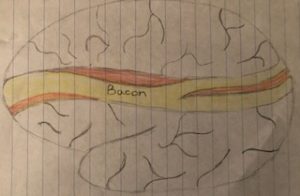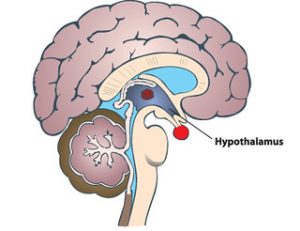 Bacon wrapped steak, bacon wrapped burger, bacon wrapped pork chop so why not a bacon wrapped brain? Literally anything can be wrapped in bacon. Even though bacon is delicious, along with all of the other fatty foods we eat, we definitely shouldn’t eat it with every meal. High fat diets have been linked to brain damage, type 2 diabetes, insulin resistance and more. This is why doctors across the country and even the world, are telling us to stop eating fatty foods frequently. Yes, there are good fats and bad fats, but constantly consuming good or bad harms your body. In fact, it may actually be your brain that is taking the brunt of the high fat diet.
Bacon wrapped steak, bacon wrapped burger, bacon wrapped pork chop so why not a bacon wrapped brain? Literally anything can be wrapped in bacon. Even though bacon is delicious, along with all of the other fatty foods we eat, we definitely shouldn’t eat it with every meal. High fat diets have been linked to brain damage, type 2 diabetes, insulin resistance and more. This is why doctors across the country and even the world, are telling us to stop eating fatty foods frequently. Yes, there are good fats and bad fats, but constantly consuming good or bad harms your body. In fact, it may actually be your brain that is taking the brunt of the high fat diet.
The brain is complex. There are many different neurons and a variety of signaling pathways a stimulus can take to make your body do what it does. Even deeper in the brain, you have chemical signals and responses. Let’s dive deeper into what happens when you eat a high fat diet and why you constantly want to eat.
Imagine taking a bite of a nice juicy bacon burger. When you ingest this high fat food, your body reacts by inducing an inflammatory response pathway in the  hypothalamus. This binds to a toll-like receptor (TLR) which is a protein that plays a key role in the immune system. When we think of the immune system, we typically think of a cold and how the body reacts by producing more mucous, a sore throat, and how it pretty much attacks itself. This sort of happens in the brain, but on a much smaller level. In the brain, IKK is produced. IKK is a response to inflammation which triggers NF-kB. This then makes its way to the nucleus to induce transcription. Here, it triggers more cytokines called TNF-alpha which bind to more receptors. This creates a negative feedback loop that is hard to stop because all you want to do is eat because the receptor is constantly saying “KEEP EATING!”. IKKβ is the big red light blaring this, which increases food intake, body weight gain, and also interrupts insulin and leptin signaling. So, different than making mucous, it makes you want to eat more and inflames your neurons. Inflammation in a neuron is actually the wearing down of myelin and the wearing down inside the neuron itself. This wearing down effects the endoplasmic reticulum, and causes oxidative stress. It may seem like this is never ending, but there are solutions.
hypothalamus. This binds to a toll-like receptor (TLR) which is a protein that plays a key role in the immune system. When we think of the immune system, we typically think of a cold and how the body reacts by producing more mucous, a sore throat, and how it pretty much attacks itself. This sort of happens in the brain, but on a much smaller level. In the brain, IKK is produced. IKK is a response to inflammation which triggers NF-kB. This then makes its way to the nucleus to induce transcription. Here, it triggers more cytokines called TNF-alpha which bind to more receptors. This creates a negative feedback loop that is hard to stop because all you want to do is eat because the receptor is constantly saying “KEEP EATING!”. IKKβ is the big red light blaring this, which increases food intake, body weight gain, and also interrupts insulin and leptin signaling. So, different than making mucous, it makes you want to eat more and inflames your neurons. Inflammation in a neuron is actually the wearing down of myelin and the wearing down inside the neuron itself. This wearing down effects the endoplasmic reticulum, and causes oxidative stress. It may seem like this is never ending, but there are solutions.
A good way to help prevent this problem and still enjoy the occasional slice of bacon or high fat food is to exercise. Exercise has been proven to increase anti-inflammatory cytokines interleukin 10 and interleukin 6. These cause a decrease in hypothalamic inflammation and reduce the risk of being diagnosed with type 2 diabetes, insulin resistance and more health problems. Another way is to eat healthier. Toss in a variety to your meals, fruits, vegetables, oats and more. A steady, slow intake of high fats is much healthier than a fast, high intake. After all, slow and steady wins the race. Or in this case, slow and steady means you get to keep eating these foods later in life.
